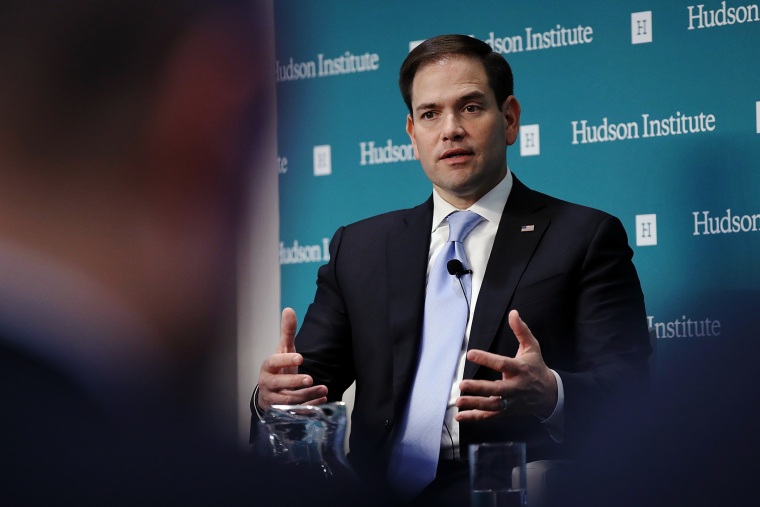It was almost exactly a year ago when Senate Republicans linked arms, ignored public sentiment, pushed aside arithmetic, and passed a massive package of tax cuts, which largely benefited the wealthy and big corporations. It was nine days later when Sen. Marco Rubio (R-Fla.) started distancing himself from the legislation he voted for.
The Florida Republican conceded last December that he and his party "probably went too far" in delivering massive tax breaks to big corporations, adding at the time that the Republican package "isn't going to create dramatic economic growth."
In April, the GOP senator went a little further in an interview with The Economist. "There is still a lot of thinking on the right that if big corporations are happy, they're going to take the money they're saving and reinvest it in American workers," he said at the time. "In fact, they bought back shares, a few gave out bonuses; there's no evidence whatsoever that the money's been massively poured back into the American worker."
MSNBC's Kasie Hunt noted at the time that Rubio "shredded" his party's arguments on the tax plan, which his GOP colleagues "are still making literally every day on Capitol Hill and in campaign ads."
As it turns out, Rubio's still at it. Here's a tweet the Floridian published yesterday:
"When corporation uses profits for stock buy back it's deciding that returning capital to shareholders is better for business than investing in their products or workers. Tax code encourages this. No surprise we have work life that is unstable & low paying."
The missive linked to a new essay Rubio wrote for The Atlantic, in which he argued, "Trusting in a corporate tax cut alone to generate innovation and boost productivity is the thinking of the past. A corporate tax-rate cut makes all corporate assets more valuable, causing a bigger return to investment no matter how it is used. In our globalized and financialized economy, though, it's as likely to induce stock buybacks as it is to spur the construction of new American factories."
Oddly enough, I'm inclined to largely agree with this. In fact, it's been well documented that the Republican tax plan has led corporations to apply their tax breaks to buying back stock, not making capital investments. It's exactly what Democrats said would happen -- and what many of the plan's GOP proponents said wouldn't happen.
All of which makes Rubio a curious messenger for this message. He did, after all, help pass the law that's producing the effects he's now criticizing.
Indeed, the Florida lawmaker helped exacerbate the same economic dynamic he's complaining about.
In fairness, it's important to emphasize that Rubio, in his piece for The Atlantic, added that he intends to introduce -- sometime "soon" -- a proposal that would "end the tax code's favoritism for companies that spend their tax cuts on stock buybacks."
But isn't it a little late for this? The likelihood of Congress tackling tax policy in the new Congress is low, and next year, the leverage the senator had to force these changes will be gone.
Remember, the success of the GOP tax plan last year was hardly assured. Several Senate Republicans were on the fence, and in a narrowly divided chamber, individual members were well positioned to demand changes that party leaders would've been compelled to accept. Rubio himself briefly suggested -- one year ago today -- that he wasn't on board with the Republican package.
He did not, however, maintain that position very long. Soon after, Rubio returned to the GOP fold and voted the way his party wanted him to.
Twelve months later, it's hard not to get the impression that the Florida senator now realizes the policy he helped pass into law isn't an especially good one.
